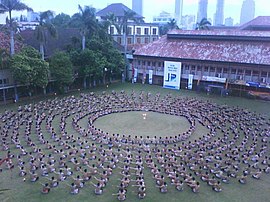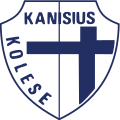Canisius College, Jakarta
| Canisius College Indonesian: Kolese Kanisius | |
|---|---|
 | |
 Kecak dance during Canisius College Education Fair, one of the school's activities | |
| Address | |
 | |
Jalan Menteng Raya 64 ,, 10340 Indonesia | |
| Information | |
| Type | Private secondary school |
| Motto | Latin: Ad Maiorem Dei Gloriam (For the Greater Glory of God) |
| Religious affiliation(s) | Catholicism |
| Denomination | Jesuit |
| Established | 1 June 1927 |
| Founder | Fr. J. Kurris, SJ |
| Rector | Fr Leonardus E. B. Winandoko, SJ, PhD (since 2022) |
| Principal |
|
| Color(s) | Blue and orange |
| Preceded by | Strada Petrus Canisius MULO Strada Petrus Canisius AMS |
| Website | kanisius |
Canisius College (Indonesian: Kolese Kanisius) is a private Catholic secondary school for boys, located in Menteng, Central Jakarta, Java, Indonesia. The school was founded by the Indonesian Province of the Society of Jesus in 1927.
Motto
The motto of the school is Ad Maiorem Dei Gloriam, Latin for "For the Greater Glory of God".
Administration structure
The school is led by a rector, who oversees the senior and junior high school directors (principals). Each principal has three vice principals, one each for curricular affairs, general affairs, and student affairs, the last one more commonly known as the prefect inside the school. The rector, principals, and prefects traditionally are ordained Jesuit priests.
History
1927–1931
Canisius' history began on 26 October 1926, with the arrival of Dr. J. Kurris, its first director. On 1 June 1927, the first class of AMS (Algemene Middelbare School) was started in a plot of land at Mentengweg. The plot of land included a 19th-century Indies Empire house where the school initially operated.[1]: 199 The construction continued, and a new plot of land was bought. The land was intended to be used as the construction site of a new house. The construction was finished on 1 July 1929.[2]: 11 On 26 October 1931, Canisius College achieved official status with the appointment of Fr. A. van Hoof, SJ, as its first rector.[3]
1931–1942
1942–1946
During World War II, all activities were suspended and the college was used as a public high school. In reality, there wasn't any activity in the school, due to the situation of Jakarta.[2]: 14
After Japan surrendered to the Allies and the Dutch forces returning to Indonesia as the NICA, Canisius was reopened on 1 January 1946. Even though the school was given the freedom to continue its activity by the NICA, the school showed resistance to NICA and supporting the Indonesian Government. The flagpole on Canisius flew the Indonesian flag. This caused the school to be partly occupied by paratroopers. When the paratroopers were replaced by the Gurkha Army, Canisius was able to re-obtain all of its territory, and re-obtained the whole building one year later.[2]: 14
1946–1949
After the reopening of Canisius, a new rector was appointed : Fr. Lodewijk Ingenhousz. Ingenhousz proposed a national focused curriculum and proposed that the Indonesian language should be used as the main language in the school. This proposal met a resistance, due to the fact of the lack of schoolbooks in Indonesian language.[2]: 14
1952–1967
In 1952, Canisius opened junior and senior high divisions. For 15 years (1952–1967), 90%-100% of students passed the national final examination. In 1967, the curriculum was changed and divided into three areas of study: culture-literature, social economics, and science. In 1974, the college implemented a point credit system.
Education
As a private school, Canisius follows the Indonesia curriculum KTSP (Kurikulum Tingkat Satuan Pendidikan). In the high school, students are divided into two programs: Natural Science stream and Social Science stream. The Natural Science stream has five classes, while the Social Science stream has two classes, or seven classes in each of the three years.
Events held by the high school representative and Student Union include the Canisius College Education Fair, the Canisius College Cup, CASANOVA (Canisius Science, Art, and Language on Festival), and the Canisius Art Blast. Each year, Canisius Senior High sends its representatives to the International Science Olympiad. Canisius also holds character building programs, with events such as jamborees, live-ins, and retreats.
Notable alumni
- Muhammad Chatib Basri, former Minister of Finance[4]
- Fauzi Bowo, Governor of Jakarta (2007–2012), Deputy governor of Jakarta (2002–2007)[1]: 199
- Arief Budiman, sociologist[5]
- Soe Hok Gie, activist and political analyst[6]
- Ginandjar Kartasasmita, former Minister of Finance[7]
- Ananda Sukarlan, first Indonesian pianist carried in International Who's Who in Music
- Sehat Sutardja, co-founder of Marvell Technology Group, one of the richest men in the United States in 2007 per Forbes
- Akbar Tandjung, former speaker of the House of Representatives[8]
- Jusuf Wanandi, Chinese-Indonesian politician and educator[citation needed]
- Sofjan Wanandi, businessman, chief of Gemala Group[9]
- Rachmat Witoelar, former Minister of Ecology and Environment Welfare[10]
Gallery
- Logo of Canisius College (1990–1991)
- Logo of Canisius College (1927–1977)
See also
- Catholic Church in Indonesia
- Education in Indonesia
- Kolese Gonzaga
- Kolese Loyola
- List of Jesuit schools
- List of schools in Indonesia
References
- ^ a b Merrillees, Scott (2012). Greetings from Jakarta: Postcards of a Capital 1900–1950. Equinox Publishing. ISBN 9789793780887.
- ^ a b c d Hok, Th. Lim Sik (1967). 40 Tahun Kolese Kanisius [40 Years of Canisius College] (in Indonesian). Jakarta.
{{cite book}}: CS1 maint: location missing publisher (link) - ^ "History". Archived from the original on 25 November 2015. Retrieved 24 November 2015.
- ^ THEODORA, AGUSTINUS YOGA PRIMANTORO, AGNES (11 May 2024). ""Ekonomi Baru", Jalan Indonesia Masuk Klub Negara Kaya". kompas.id (in Indonesian). Retrieved 10 June 2024.
{{cite web}}: CS1 maint: multiple names: authors list (link) - ^ Ariyanto, Yus (3 January 2023). "Sebelum Arief Budiman Menjadi Cendekiawan "Kiri" Kenamaan". tirto.id (in Indonesian). Retrieved 10 June 2024.
- ^ Andryanto, S. Dian (17 December 2021). "Tentang Soe Hok Gie, Aktivis Mahasiswa Di Sebuah Zaman". Tempo. Retrieved 10 June 2024.
- ^ "Ginandjar Kartasasmita, Politisi, Birokrat" (in Indonesian). Merdeka.com. Archived from the original on 25 July 2018. Retrieved 25 July 2018.
- ^ "Akbar Tanjung" (in Indonesian). Merdeka.com. Archived from the original on 23 June 2016. Retrieved 25 July 2018.
- ^ "Profil Sofjan Wanandi". merdeka.com (in Indonesian). Retrieved 10 June 2024.
- ^ "Profil Rachmat Nadi Witoelar Kartaadipoetra". merdeka.com (in Indonesian). Retrieved 10 June 2024.


